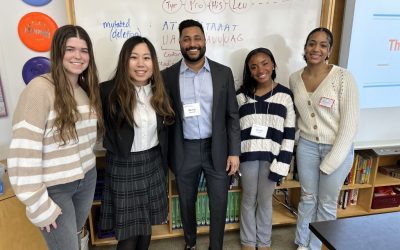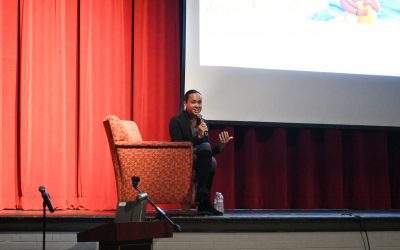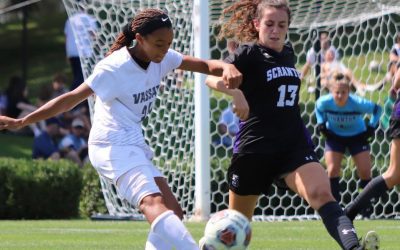Embracing Ethnic Diversity, Equity, and Inclusion at MFS
Embracing Ethnic Diversity, Equity, and Inclusion at MFS

Students, faculty, and staff at the 2018 National Association of Independent Schools People of Color Conference/Student Diversity Leadership Conference in Nashville.
2020 will be remembered as a year in which the physical and emotional wounds of racial injustice were opened deeply in the United States, while the country concurrently dealt with a pandemic. The killings of George Floyd, Breonna Taylor, and Ahmaud Arbery spurred countrywide protests, some of which unfortunately turned violent. The forced quarantine in most states provided the opportunity for in-depth discussion and reflections to take place across the country. These ranged from household conversations to virtual forums, discussions and other opportunities for citizens to share their views, stories, and, in many cases, strife. Until the last few decades, MFS did not have a great deal of ethnic diversity among its student population, faculty, and staff. Samuel Cobbs ’62 is regarded as the first African American to enroll at MFS in 1960. He was selected by the American Friends Service Committee from a group of 75 students in Virginia’s Prince Edward County seeking an education after their schools had been shut down due to local officials’ rejection of court-ordered school desegregation.
In the 1970s, Moorestown Friends established the Camden Scholars Program. The program now provides unique opportunities to students of color from Camden schools entering grades 7 and 9, and more than 120 Camden Scholars have graduated from MFS.
In the mid-1980s, the school enrolled 18% students of color and employed just a handful of faculty and staff of color. By 2003, the percentage of students of color had climbed to 25%, and the 2004 Strategic Plan set a goal to increase that percentage to 30%. The 2011 Strategic Plan identified a goal to increase the percentage of faculty and staff of color to mirror that of the school community. As the demographics of South Jersey have changed with an increase in Southeast Asian and East Asian families and increasing diversity in the suburbs, the school population has begun to more accurately reflect the surrounding community in its ethnic composition. The percentage of students of color has risen to 46% in 2020, with 25% of faculty/staff now people of color.
A more proactive approach to issues of diversity and inclusion has also been taken by the school over the past two decades. Former Spanish Teacher Karen Washington was appointed the school’s first Director of Multicultural Affairs in 2007. In this position, she was a valuable resource and advocate for students, families, faculty, and staff, assisting in developing curriculum that honors diversity and inclusion and supports students in claiming their identities and voices. Karen (whose position was eventually changed to Director of Diversity and Inclusion), in concert with the 2011 Strategic Plan, established divisional diversity coordinators with whom she planned professional development and much more. She supported student organizations at the school that encouraged discussion around diversity and inclusion, such as the MLK, Jr. Club, Diversity Committee, Gender Equality Forum, and more.
Her successor, Dorothy López, continues to expand on Diversity, Equity and Inclusion (DEI) work at the school. In addition to divisional diversity coordinators, her team now includes a Camden Scholars Program Coordinator and International Programs Coordinator. As part of our emerging 2020 Strategic Plan, overarching goals in this area include the integration of DEI and Quaker values, and reenvisioning the definition of students’ success to reflect that an MFS education includes being a culturally competent global citizen of courage and consequence.
Faculty and staff annually attend the National Association of Independent Schools People of Color Conference which provides a space for leadership and professional development for people of color and allies. The other keystone event is the Student Diversity Leadership Conference, at which student ambassadors build cross-cultural communication skills and strategies for social justice and bring those tools back to their school communities.
A significant commitment has also been made by MFS to professional development for faculty and staff, as well as programmatic celebrations and events for students and families. A successful initiative to establish affinity groups among students, faculty, and staff also began last year. Middle and Upper School students, faculty, and staff now have the opportunity to meet and discuss issues and topics related to the specific affinity groups with which they identify.
Dorothy López, with Julia de la Torre, led the school’s response to and support of students and families during this tumultuous summer. One of the primary responses was to offer two listening sessions to give participants the opportunity to share experiences in the MFS community: one for alumni held in August and one for parents and guardians held in October (postponed by August storms/power outages). Following remarks by Julia and Dorothy, breakout sessions for participants were hosted by Calvin Bell ’20 (Emory University) and Bailey Butterworth ’20 (Smith College). Calvin and Bailey were the 2019-20 clerks of the Upper School Diversity Committee. Calvin led conversations for the Black Student Union affinity group and Bailey led the White Ally affinity group. Calvin and Bailey are passionate about these issues and have received training from multiple organizations in facilitating conversations related to diversity, equity, and inclusion.
Please read passages from an interview conducted by Dorothy López with Calvin and Bailey to hear more about their thoughts and reflections.
Calvin Bell ’20
 On the killing of George Floyd:
On the killing of George Floyd:
I think that it was something that was building up and now people were quarantining and really isolated. So your eyes were open a little bit more to what the world was exposing. People were reading the news a little bit more and watching TV more. And so when you see those images, you see that video of George Floyd… there is something inside of you that asks, ”What can I do?”
On the alumni listening session:
Going into the listening session, I was a little nervous because of the age gap. The ideas and the viewpoints of different people may be different as well, depending on what was going on during their time at MFS vs. the point that we’re at now. I wanted to understand their story and not really give my own input.
On forming an alumni network:
Several people in the group were suggesting a network for people of color to engage alumni and students. That was something that I really played off of, and asked questions about how we could really utilize a network to help each other out and to engage with their perspective.
On affinity groups:
In order to become inclusive, you have to include other people. And I feel like our school has been trying to open up new voices to what diversity, inclusion, and equity are in the school community because it’s very foreign for a lot of people. In Diversity Committee we heard new voices that I never expected to be in Diversity Committee and they even wanted to be a part of an affinity group… And so to see their passion, for it, to see that they actually cared, to see that it was genuine to really change the community… it also allowed them to pass that same generosity, that same passion, on to younger voices to come up into diversity work and really get engaged with it.
Bailey Butterworth ’20
 On the alumni listening session:
On the alumni listening session:
I had members in my group from the 1960s and the 1980s. So the first hurdle was understanding that the way that we talk about these kinds of things, and language we use, have changed radically. But I think that once you’re set up with good intentions and understand the terms, you can come to a point of clarity about what is being said and we could communicate well.
When helping to process people’s feelings about injustice, it’s not that different from processing any other emotion of grief or anger. I often think about what it means to be a good friend and someone who can listen and provide support and empathy. That is a skill that I’ve gleaned from being here (at MFS) for 15 years.
On MFS strengths:
The DEI team at MFS is involved with all areas of the school. I feel like I’m close to the administrators doing this work. I feel like I’m closer to admissions by doing this work. And just the idea that I’ve had all these opportunities to help change my school really speaks volumes. As an institution, we’re obviously far from perfect, but the fact that we as students get such a large role in helping “chase, chase, chase” that perfection makes all the difference to me.
I’ll also do a plug for Quakerism. I think being a Quaker school lays the foundation in early education for these ideas, for the idea of radical empathy and for this work. The history of Quaker activism by itself is a history that I think exemplifies the kind of work we’re doing with diversity, equity, and inclusion.
On affinity groups:
I led the White Ally affinity group… I had members of my group contact me and say, “This is really interesting. I’ll go home and talk about it with my parents and then we have these discussions or I’ll talk about it with my siblings or I’ll talk about it with my friends.” And that, I think, is the ultimate purpose of affinity groups – that the lessons, experiences, and knowledge that you gain, you take out and you distribute outside of this group. That’s the ultimate purpose to have these people act as agents of change in every other sphere of their life.
Alumni News
Upper School Students Look to the Future at Career Day
Eleventh and twelfth grade students took advantage of the opportunity to network and learn much more about the professional world at the annual MFS Career Day yesterday. Alumni, parents, alumni parents, and friends of the school provided sessions in their areas of...
ABC News Anchor Linsey Davis ’95 Visits MFS for Book Signing
Linsey Davis ’95, ABC World News Tonight Anchor and five-time children’s book author, returned to campus on November 3 to share her most recent book, The Smallest Spot of the Dot, with the MFS community. The day included: an assembly with Lower School students,...
Foxes Alumni Student-Athletes Making Impact in Fall College Seasons
As the Fall sports season winds down at MFS, a number of alumni student-athletes are also in the thick of their NCAA seasons: Ava Carlson ’22 is the starting goalie for the Dartmouth Field Hockey team. She was recently named DartmouthSports.com Athlete of the Week...



